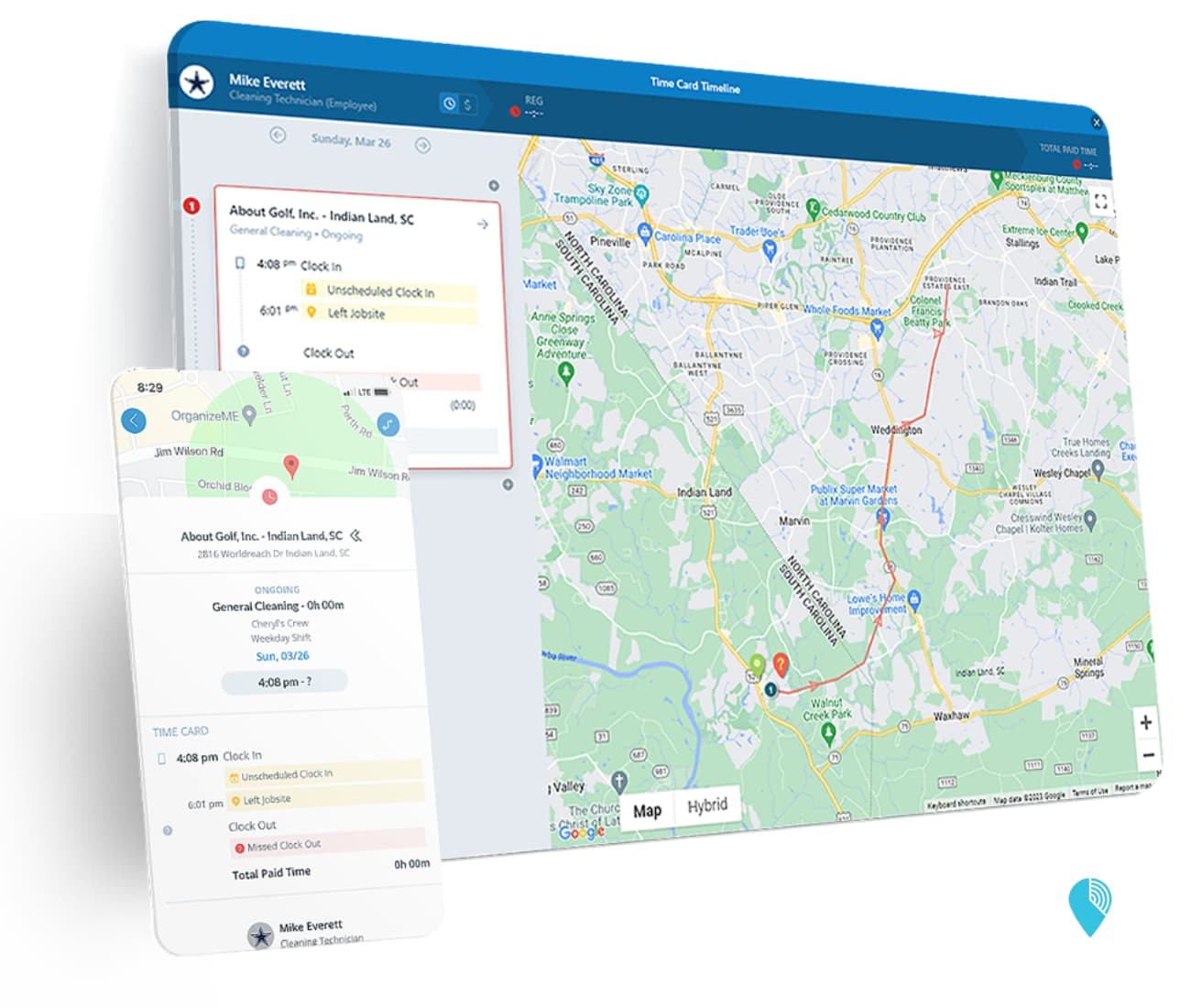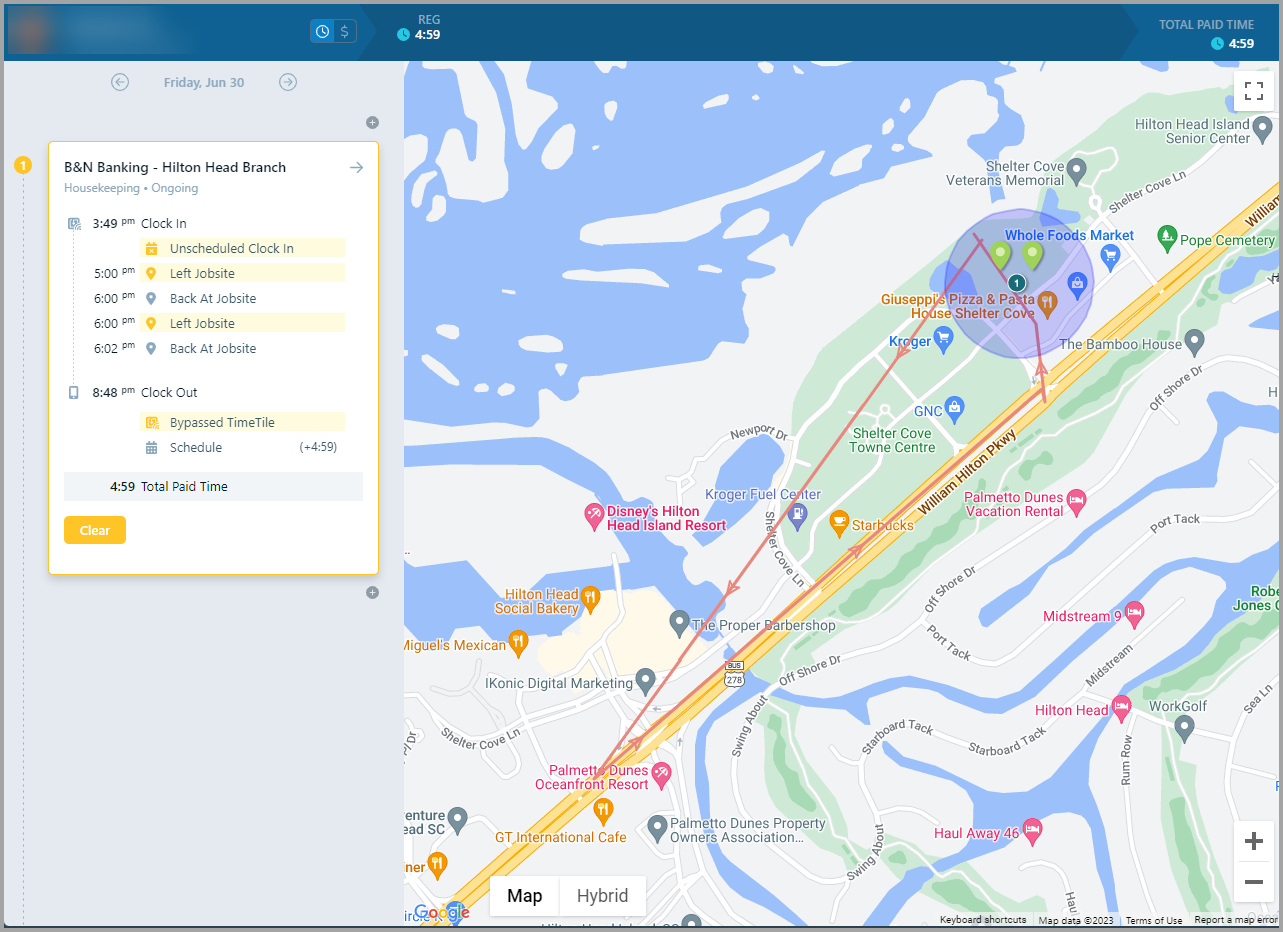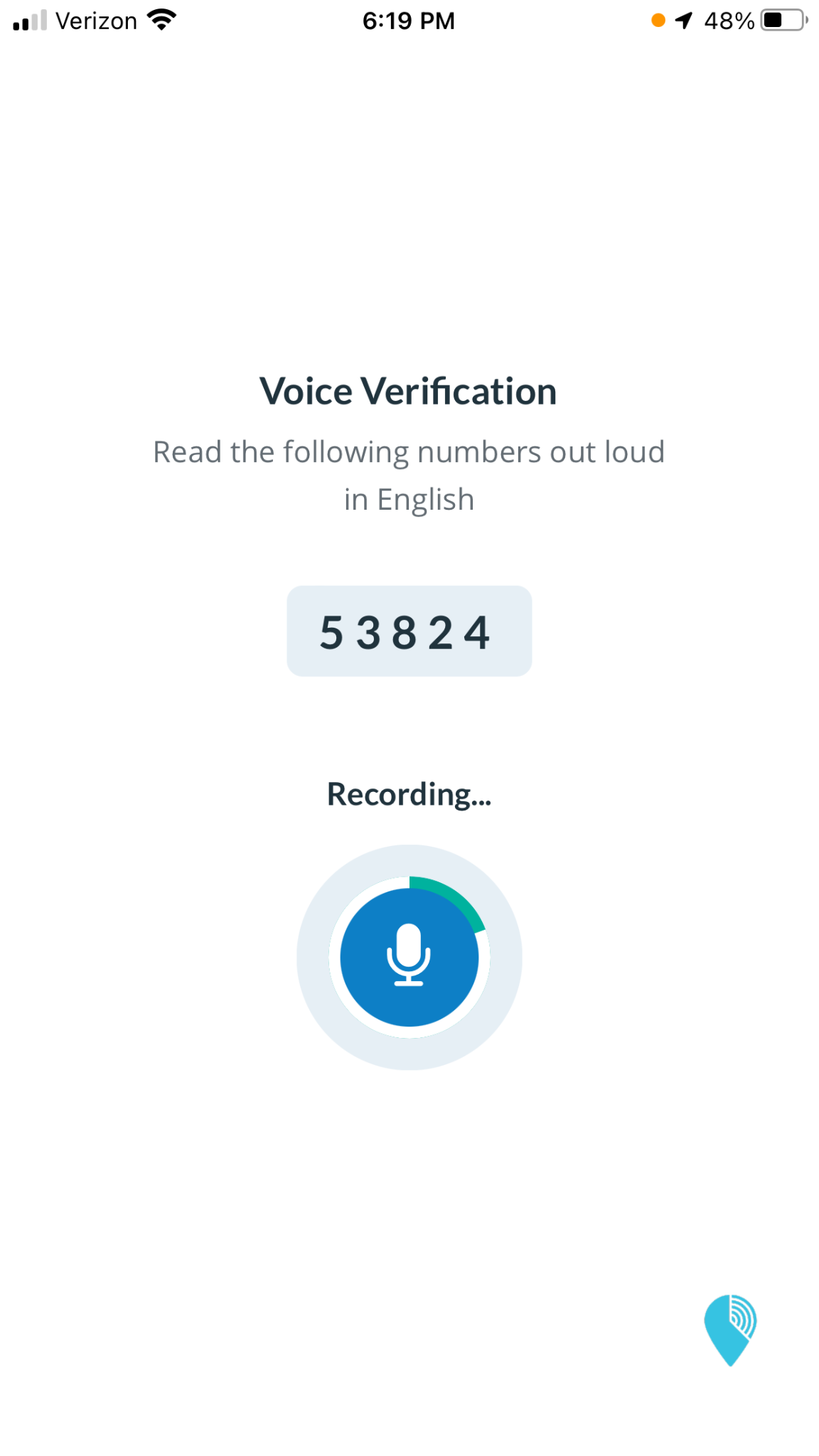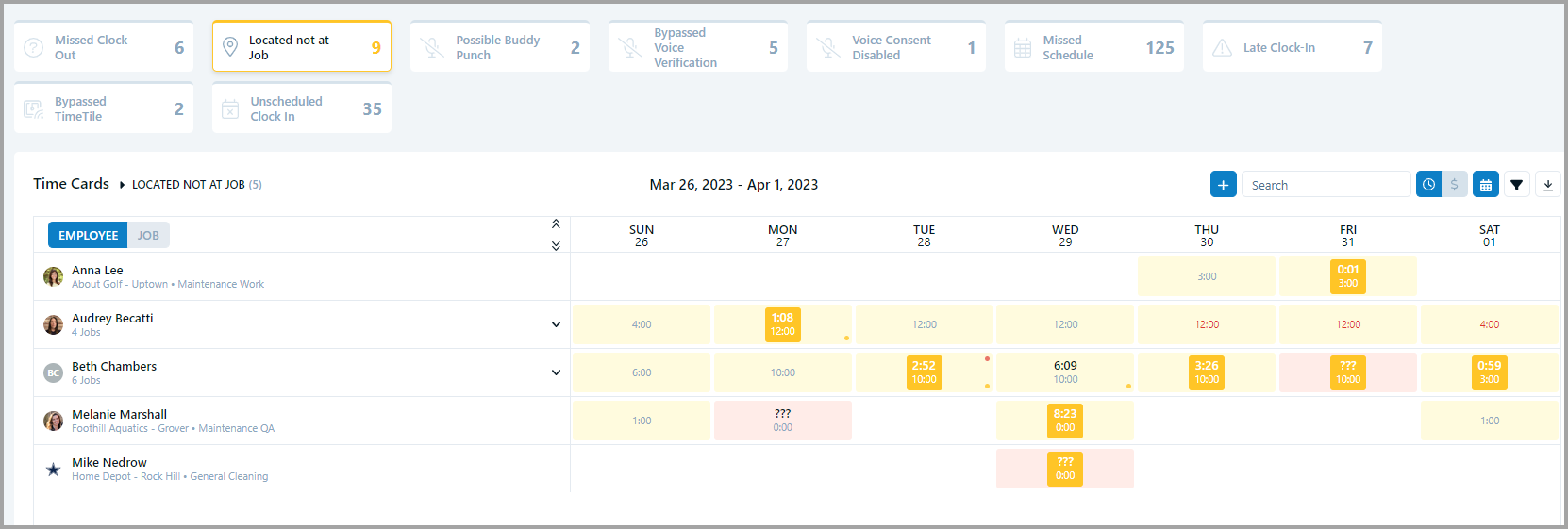Prevent Time Theft: 5 Time-Tested Ways to Protect Your Profits

Mark, the owner of a small commercial cleaning company, savored a mouthwatering ribeye with his wife at the local steakhouse, cherishing a rare moment of relaxation after a demanding week. However, his serenity was shattered when his long-trusted supervisor, who was supposed to be on the work site, entered the restaurant with his girlfriend. Unfortunately, Mark was the victim of an expensive issue plaguing 75% of field service businesses - employees commit time theft.
Time theft occurs when employees misrepresent their time, and companies pay for time not worked. Stealing time is a silent but monumental labor problem costing businesses with hourly employees an estimated $400 billion annually in unearned wages and lost work productivity. When companies pay employees for unearned time, the financial repercussions for the company are far-reaching and damaging.
How can employers effectively address this problem and eliminate time theft in the future? The key lies in understanding the nature of time theft, finding ways to prevent it, and taking appropriate action.
We will explain time theft, explore its various forms, discuss the costs of time card fraud, and provide prevention strategies. By the end of this post, you'll be equipped with the knowledge and solutions necessary to eliminate time theft and protect your business from its damaging effects.
Do you want to ensure that your employees are always at the job site when clocking in?
Short Summary
-
Understand the various forms of time theft and identify them in your workplace.
-
Be aware of the high costs of time card fraud and the often-overlooked financial implications.
-
How to use online time tracking software to prevent time theft.
Table of Contents
- Understanding Time Theft
- The High Cost of Employee Time Theft
- 5 Often Overlooked Financial Implications of Stealing Time at Work
- Identifying Time Theft in Your Workplace
- 5 Ways Chronotek Pro Prevents Employee Time Theft
- Summary
- FAQs about Time Card Fraud
Understanding Time Theft

Employees stealing time is an insidious problem that manifests in various ways. At its core, time theft is when employers pay employees for time they have not worked, with consequences that are often overlooked or underestimated.
How do employees steal time? A few ways:
-
clocking in several minutes early to scheduled jobs
-
clocking in or out away from the job sites
-
taking longer breaks than allowed
-
buddy-punching
-
fudging handwritten timesheets
-
leaving the work site while on the clock
-
engaging in other personal activities or tasks during work hours.
Stealing time is most common among mobile workforces, such as construction, commercial cleaning, security guards, landscaping, plant merchandisers, and all field service companies. These remote employees can steal time easily because they have little supervision and accountability. According to a recent study, almost 45% of workers admit to punching in a few minutes before or after their scheduled times. Using handwritten timesheets for time tracking instead of a time clock app compounds the problem.
The High Cost of Employee Time Theft

As our customers reported in a recent survey, the impact of employees stealing company time and inaccurate handwritten timesheets can be substantial and cost companies up to 10% of their annual payroll. A few extra minutes every day adds up.
If you employ 25 part-time workers who work 20 hours a week at an average wage of $15 per hour, your total annual labor costs, including payroll taxes and workers' compensation, would be approximately $500,000. If your employees steal company time, it could cost you around $50,000 annually. The actual damages could be far worse than 10%, as some sources report that most employers lose about 4.5 hours per week per employee to time theft.
Another study estimates that employee theft costs U.S. employers more than $400 billion annually in lost wages and productivity.
5 Often Overlooked Financial Implications of Stealing Time at Work
1 - Stolen Time Leads to Overtime
Companies with full-time hourly workers have an extra concern. When employees fraudulently pad their paper timesheets or find ways to steal time at work with a time clock app, these extra hours can push them into unnecessary, expensive overtime pay. Wages that are 50% over expectations can kill job budgets, adding to company losses.
2 - Unearned Time Disrupts Job Costing Tracking and Job Budgets
Job cost tracking involves assigning overhead costs to specific projects based on the time worked. But if employees steal time, it messes up the calculation of these costs. It becomes more challenging to know how much each job actually costs. Time fraud also creates a difference between planned and actual work hours. This difference causes budget problems and makes it difficult to know the actual cost of a project.
3 - Stealing Company Time Drains Resources for Retaining Good Employees
Employees stealing time is the same as stealing money because it results in unnecessary labor costs for your company. You could allocate this company money for salary increases and merit-based bonuses to deserving employees. Financial incentives would enhance employee retention efforts and boost employee morale.
4 - Stealing Company Time Impacts Quality Control
When employees commit time fraud, it creates an atmosphere of dishonesty and a lack of accountability within the workforce. When employees feel they can get away with stealing time, they may be less motivated to adhere to quality control standards, leading to a decline in service quality. Also, the time it should take to do a job well is not actually getting done. Quality suffers, which leads to unhappy customers.
5 - Time Card Fraud Leads to Lost Productivity
Employees who steal 4.5 hours a week leave that much work unfinished. Imagine 25 employees stealing over 100 hours a week, and try not thinking about your wasted $1500, but only consider the work left undone. This constant loss of work productivity necessitates hiring more employees to get the work done.
Identifying Time Theft in Your Workplace
Uncovering employee time theft in your workplace requires vigilance and a keen eye for employee behavior. Tracking employee hours is a crucial first step in uncovering time theft and ensuring you accurately pay workers for their time. You can achieve this with a time and attendance system, such as Chronotek Pro, which can track employee hours and highlight potential fraudulent hours.
In addition to monitoring employee hours, employers should be aware of common time theft behaviors. Managers should pay attention to the following: taking extended breaks, personal calls, fudging handwritten employee timesheets, engaging in personal activities while on the clock, leaving the work site while on the clock, or buddy punching – which occurs when an employee clocks in or out for a coworker who is not actually present. All of these activities are considered time theft.
By recognizing these behaviors and implementing effective time and attendance systems, employers can minimize the occurrence of employee time theft and protect their company's financial interests.
5 Ways Chronotek Pro Prevents Employee Time Theft

Preventing time theft in the future requires a multifaceted approach encompassing clear rules, consistent disciplinary procedures and actions, improved morale, benchmarks, and the use of automated time-tracking solutions. We'll discuss five specific ways Chronotek Pro helps prevent time card fraud with a remote workforce, ensuring you capture real work time and easily pinpoint falsely reported hours.
1 - GPS Tracking Tracks Employees On the Clock
Chronotek Pro uses proprietary GPS location tracking methods to ensure you know when employees don't clock in at the job location. Custom geo-fences allow Chronotek Pro to send push notifications to supervisors when employees are GPS-located clocking in away from the job, and when they leave the site while on the clock. Pro also displays these location violations as yellow issue tiles on your website admin dashboard (along with other time card issues). Additionally, you can prevent employees from clocking in if they don't enable GPS location services.

Look at this time card showing an employee clocking in at the customer site and leaving and returning - all while on the clock, another way to steal time at work - an obvious case of stealing time at work. The red lines with arrows indicate the area where the employee traveled.

2 - Two-Factor Authentication Eliminates Buddy Punching
Every employee has a unique login with the Chronotek Pro time tracking app, which requires two-factor authentication using the employee's cell phone number. Employees clock themselves in, but they can't clock in their buddies.
3 - Biometric Voice Verification Prevents Punching In For Other Employees

The Chronotek Pro time clock app has an exclusive biometric voice feature that verifies an employee's voice on clock in and out. The app prompts your employee to read aloud a sequence of numbers in their native language, detecting if it's your employee's voice.
*Feature coming soon
4 - Reporting and Analytics Identifies Problem Trends

Chronotek Pro's time and attendance software provides detailed reports and analytics on employee attendance and time card activity. These insights enable employers to further track employees and identify patterns, anomalies, and potential instances of time theft. The time dashboard above shows Beth clocked in away from the job four times in one week, accounting for half of the instances in which employees may be stealing time at work.
5 - NFC-enabled TimeTiles™ Requires Employees To Clock In at the Work Location

TimeTiles™ are tamper-proof, weatherproof 2 ½” square PVC tiles that you code to each job location. TimeTiles™ uses Near Field Communication (NFC) technology to ensure employees clock in at the job sites. Combined with GPS tracking, you'll know if employees leave the site while on the clock and they can't buddy punch, making it harder to steal time at work.
Chronotek Pro is your ultimate solution to eliminating time theft. With meticulous design, we have empowered you to regain control over your daily operations by bringing visibility to an otherwise elusive issue. Key features such as GPS tracking, two-factor authentication, voice biometrics, reporting and analytics, and NFC-enabled TimeTiles™ work together to eradicate time theft at work and give you accurate time.
Summary
In conclusion, addressing and preventing time theft is a critical aspect of maintaining a productive and efficient workplace. By understanding the various ways employees steal time at work and their high costs, identifying them in the workplace, and following a structured process to issue a written warning, employers can protect their businesses from the financial and operational consequences of time theft.
To reduce theft completely, you need to follow three key steps: establish a clear policy, promote accountability, and use automated timekeeping solutions like Chronotek Pro. These components form a comprehensive strategy against time theft. By taking these steps and remaining vigilant, employers can ensure a fair and productive work environment, free from the costly effects of time theft.
Now that you're up to speed on employee time theft, it's worth your time to read our article, Time Card Management: Is It Illegal To Change An Employee's Time Card?
You don't want to get into trouble with the Department of Labor with the issue on the flipside of this coin - wage theft.
Frequently Asked Questions about Time Card Fraud
1. What is time theft?
Time theft refers to employees misrepresenting their time worked and companies paying them for time they have not worked. It includes activities such as clocking in early, taking longer breaks than allowed, punching in for others, fudging time sheets, or engaging in personal tasks while on the clock. This practice is more common among hourly employees rather than salaried employees.
2. How does time theft impact businesses?
Time theft in its different forms can have significant financial implications for businesses, costing up to 10% of annual payroll and damaging productivity. It can also lead to unnecessary overtime expenses, disrupt job costing tracking and budgets, drain resources companies could use for employee retention efforts, impact quality control, and damage employee productivity.
3. What are the financial implications of time card fraud?
Falsely reported hours can lead to additional overtime expenses, disrupt job costing tracking and budgets, drain resources for employee retention efforts, impact quality control, and damage employee productivity. It costs U.S. employers an estimated $400 billion annually in lost wages and productivity.
4. Which industries are most susceptible to time theft?
Industries with a mobile workforce, such as construction, commercial cleaning, security guard, landscaping, and field service companies, are particularly susceptible to time theft. Remote employees with little supervision and accountability are likelier to commit time theft.
5. How can employers identify time theft in the workplace?
Employers can identify time theft by monitoring employee hours and being vigilant for common time theft behaviors, such as extended breaks, personal tasks while on the clock, fudging timesheets, leaving the job location while on the clock, or punching in for others. Automated time tracking solutions, like Chronotek Pro, help track and highlight ways employees steal time at work.
6. How can Chronotek Pro prevent time theft?
Chronotek Pro is an online employee time-tracking software that helps businesses prevent time theft by accurately recording employee work hours. Chronotek Pro uses two-factor authentication for employee logins, voice biometrics, GPS tracking features, reporting and analytics, and NFC-enabled TimeTiles™ to prevent employee time theft.
7. How can Chronotek Pro help businesses save money by preventing time theft?
Chronotek Pro helps businesses save money in several ways by effectively preventing time theft. It ensures accurate payroll calculations, eliminates unnecessary overtime costs, reduces budget discrepancies caused by time fraud, and improves overall productivity. These savings can significantly impact a company's bottom line and protect its profits.
Conclusion
In conclusion, safeguarding against time theft is paramount for businesses to protect their profits and maintain operational integrity. Employing a combination of time-tested strategies can effectively mitigate this risk. First and foremost, implementing robust time tracking systems, such as biometric or GPS-enabled solutions, ensures accurate recording of employee hours and prevents unauthorized time padding or buddy punching. Secondly, establishing clear policies and expectations regarding punctuality, breaks, and overtime helps create a culture of accountability and compliance among employees. Regularly monitoring and auditing time records for inconsistencies or anomalies allows businesses to identify and address potential instances of time theft promptly. Moreover, providing ongoing training and communication about time tracking policies and procedures reinforces their importance and helps deter misconduct. Lastly, fostering a positive work environment built on trust, recognition, and fair compensation can reduce the likelihood of employees resorting to time theft out of dissatisfaction or discontent.
By implementing these time-tested methods, businesses can protect their profits, maintain employee morale, and uphold integrity in their workforce management practices.
By embracing these solutions, you can simplify payroll processes, reduce administrative burdens, eliminate time theft, and minimize costly mistakes. Invest in an automated time clock system to save time and money while ensuring accurate and efficient payroll calculations. With the right tools and processes, you can focus on more strategic aspects of your business and watch your profits grow.





